MPs say government caused ‘real distress’ to trans people and call for reform to Gender Recognition Act
The inquiry by the Women and Equalities Committee was set up in 2020 after the government responded to a consultation on reform to the GRA.

Words: Alastair James; pictures: Wiki
The UK Government has been strongly criticised by a committee of MPs for causing “real distress” to the trans community over its reforms to the Gender Recognition Act and is being urged to make changes soon to ease the process of transitioning.
The inquiry by the Women and Equalities Committee was set up in October 2020 after the government responded to a consultation it had run on the Gender Recognition Act. The government’s response included digitising the process, reducing the fee from £140 to £5, and opening at least three new gender identity clinics.
Today’s (21 December) report recommends that the process move closer to self-identification and the requirement of a diagnosis of gender dysphoria should be removed.
“Deeply disappointed”
Caroline Noakes, a Conservative MP who chairs the Committee, says “The GRA is crying out for modernisation, and the Government has spectacularly missed its opportunity,” before adding “Being trans is not an illness,” and calling for “meaningful change”.
The report calls the government’s delay to respond to the consultation “unacceptable” adding that the delay exacerbated tensions “between an already polarised group of stakeholders, but it also caused real distress to many within the transgender community.”
It goes on to argue that the approach from the Equalities Office has left them “deeply disappointed” and is “inexcusable”, and highlights the failure of the government to appear at evidence sessions as part of the inquiry.
The Committee received over 2,000 evidence submissions as part of its inquiry, and heard from a number of groups such as Mermaids and other LGBTQ and trans organisations.
On the government’s response to the GRA consultation, the report describes it as “minimal and ignored areas where there was a majority in support for change.” The three clinics, mentioned above, were already announced prior to the government’s consultation response.
Our report into the Reform of the Gender Recognition Act is being published tomorrow. Take a look at the work we have done relating to this inquiry over the past year: https://t.co/uOlY23nhuN pic.twitter.com/l123I2UQyQ
— Women & Equalities Committee (@Commonswomequ) December 20, 2021
In relation to the Gender Recognition Act 2004, the Committee recommends that the requirement of a diagnosis of gender dysphoria in order to obtain a Gender Recognition Certificate should be removed and the process moved closer to self-ID.
It adds “appropriate safeguards are essential” to protecting the rights of natal women and the use of the single-sex and separate-sex exceptions in the Equality Act 2010. “Therefore, it is appropriate to retain the statutory declaration, as well as introduce additional legal tests,” it goes on to say.
The requirement to live in someone’s preferred gender for two years should also be scrapped, it says, as it “risks entrenching outdated and unacceptable gender stereotypes.” Spousal consent should also be removed.
The Committee agrees with the government that 18 should be when someone can apply for legal gender recognition. A review on the currently opaque Gender Recognition Panel (which approves Gender Recognition Certificates applications) is needed to consider replacing it with the Registrar General for England and Wales.
The committee has also suggested that the Government Equalities Office and Department for Health and Social Care develop a healthcare strategy for transgender and non-binary people “within the next year.”
It has also expressed concern that the LGBT Action Plan was abandoned (following a number of resignations) and is urging the Government to resume the Plan.
A Government Equality Hub spokesperson says it has listened during the consultation and the department is “taking steps to modernise the way that individuals can apply for a Gender Recognition Certificate as a result, including reducing the cost and moving the process online.”
The Attitude 101 issue is out now to download and order globally. The Attitude 101 issue includes the FREE Attitude 2022 calendar, presented in association with Taimi.
Subscribe in print and get your first three issues for just £1 each, or digitally for just over £1.50 per issue.

